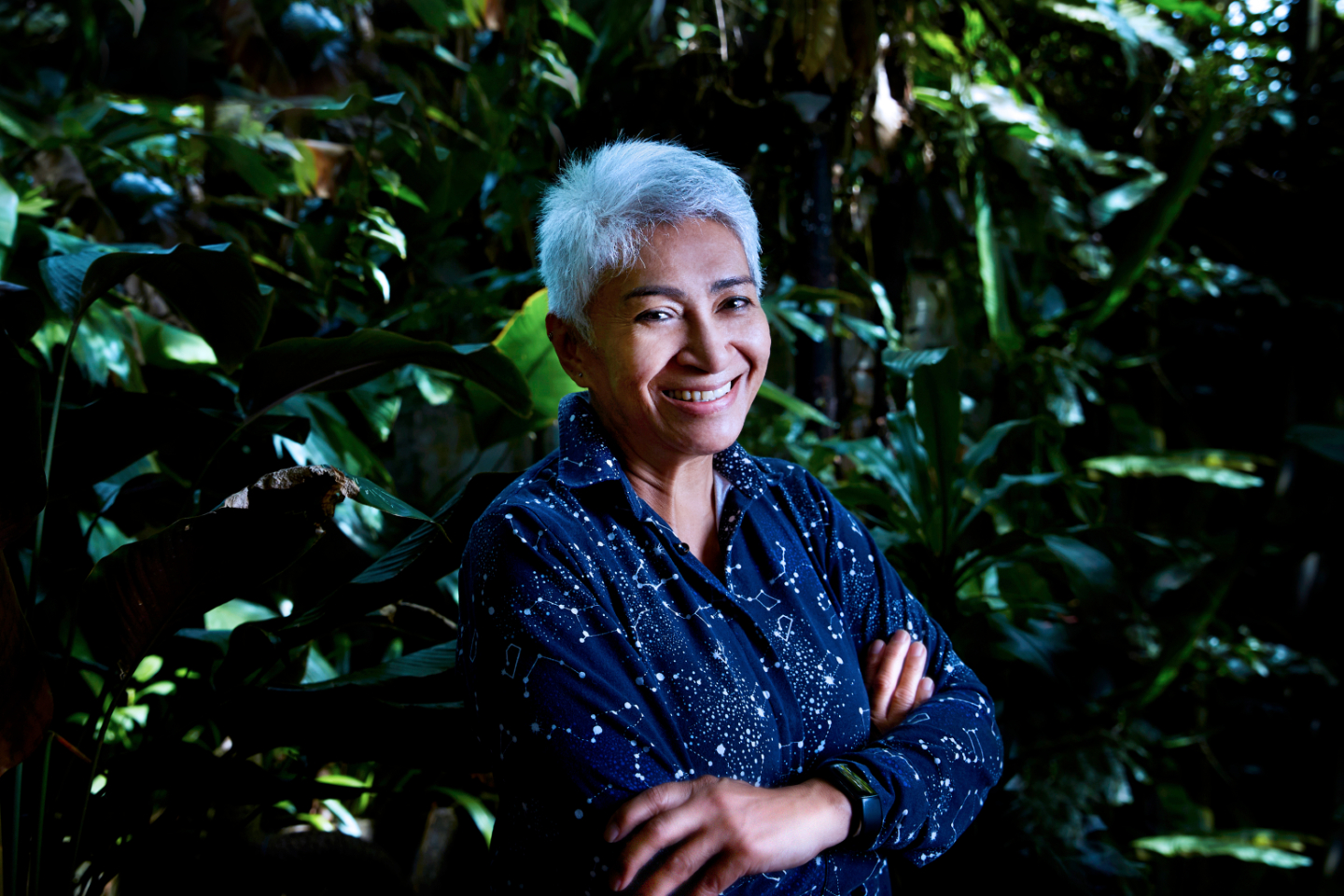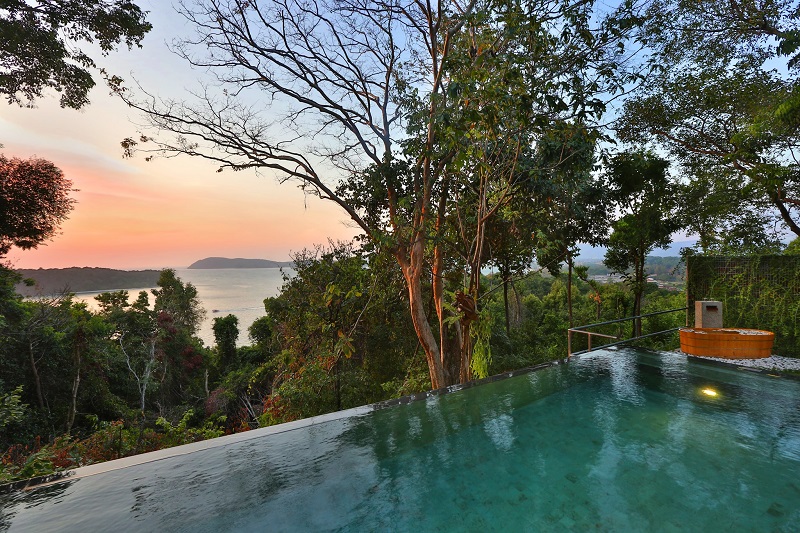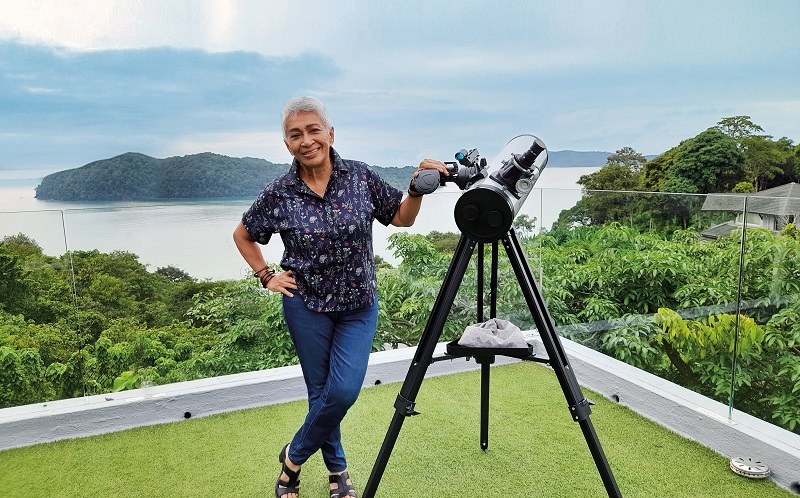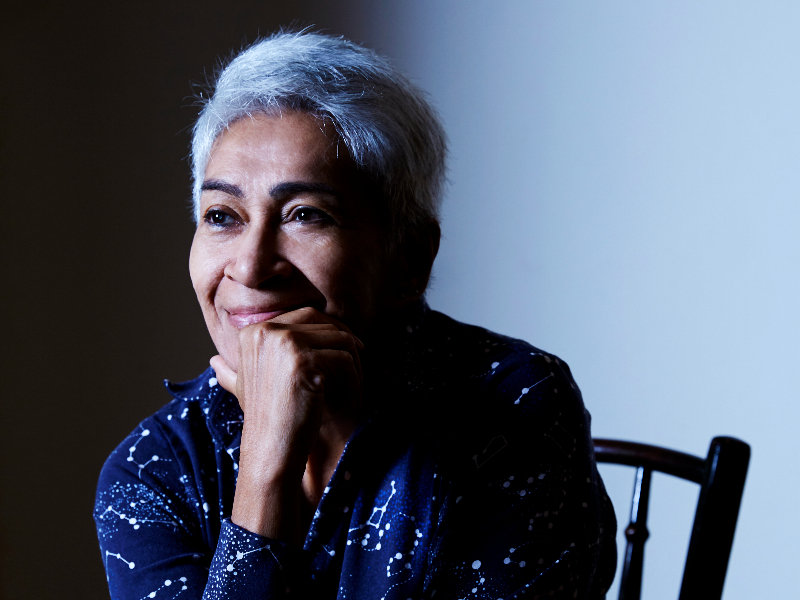
Learning is a continuous process for Mazlan (Photo: SooPhye)
One of the first questions Mazlan Othman remembers asking as a nine-year-old was: Why is Mother Teresa going to hell? The reply she got — that the India-based Albanian humanitarian was not a Muslim — stunned her. “I was like, what? It was injustice and I used to rebel against all that.”
Years later, she would learn that Islam is progressive and accommodating. In fact, Jewish and Christian scientists in bygone days found refuge in Islamic countries, which advanced because of science.
Over breakfast at Ambong Pool Villas in Langkawi, Mazlan, the nation’s first astrophysicist, pauses to accept pineapple juice offered by one of the wait staff — “I like it; it has antioxidants” — and lets on that she basically eats what she likes, whenever she likes. “I have no dietary limitations. I know what’s good for me but I don’t usually do it,” she laughs.
When she trains to climb mountains, though, she follows a strict exercise programme. Her last climb was in 2019, to Gokyo Ri, a 5,300m peak in the Khumbu region of Nepal. There was a subsequent trip but she missed it because “I was 5kg overweight. I still am”.
Eleven years ago, she had both knees replaced when her orthopaedic surgeon suggested a long-term solution to the pain. “I was running too many marathons and he had been injecting fluid for three years. I thought surgery was logical and for the best. It was not about the body; it’s about the mind.”
The conversation with Mazlan moves easily from one topic to another, a delightful reflection of her varied interests. For a start, the titles preceding her name are a mouthful — Professor Emerita Tan Sri Dr — but she shrugs them off with ease at the resort named after the merambong (sea lettuce) and looks skywards to the wide beyond that has been her orbit for decades.
Mazlan had been invited by Ambong-Ambong co-founder Amran Ahmed to talk about space exploration and humanity’s place in the cosmos to in-house guests. Positively or otherwise, she began, Elon Musk grabbed attention with his SpaceX Starship and talked about space travel, and she proceeded to outline the attractions of that new frontier.
ambong_2_langkawi.jpg

After her enlightening session titled Destination: Mars on Dec 5, guests stepped up to observe the Moon and Jupiter on a night in the week when Mars was approaching opposition to Earth — as the sun sets in the West, the Red Planet rises in the East. Amran muses that it could be during one of these cycles when the two planets are closest to each other, which occurs about every 26 months, that humans would one day set foot on Mars.
Mazlan is one polymath who is at home talking about the earth, sky, outer space and everything else in between. The facts are at her fingertips and she clearly enjoys telling stories about the stars and planets. There are gaps and blanks in the big picture, but they do not dampen her excitement about the unknown.
“When we look to the future, we’re looking at 30 to 50 years, and everybody is scared when we talk about that span of time. In astrophysics, we talk about millions and millions of years. Trust me, 35 years is nothing. I’m fearless.”
A million years does not mean anything to most people because we are self-absorbed, she reckons. “It might make a difference if we were to stretch our minds a bit and think in terms of the human race, not the self as an individual.”
She walks the talk and has done things that are out of this world, literally. The Colombo Plan scholar did her PhD in astrophysics at the University of Otago in Dunedin, New Zealand, the first to obtain a doctorate in physics almost 120 years after the university’s founding. She pioneered Universiti Kebangsaan Malaysia’s academic programme on astronomy and directed the design and construction of the National Planetarium, which opened in 1993.
Mazlan was director-general of Angkasa, the National Space Agency, and instrumental in launching Malaysia’s first astronaut, Sheikh Muszaphar Shukor Al Masrie Sheikh Mustapha, to the International Space Station in 2007. In 1999, she was appointed director of the United Nations Office for Outer Space Affairs, and in 2009, deputy director-general of the UN office at Vienna.
Now a senior fellow of the Academy of Sciences Malaysia, Mazlan shares that she had never seen an astronomy book until she went to Otago at the age of 20. “I discovered astrophysics in my third year and realised it was what I had been wanting to do: The physics and the aesthetics, philosophy, culture and everything are in there.
“When you look at the universe, you are inspired in all your senses. It makes me feel small and humbled that there is a whole universe [waiting] to be discovered. About 95% of space is still unknown and 25% of that 95% is what we call dark matter. If there is going to be a discovery, it will be in the field of astrophysics because so many things are unknown.”
In the last decade or so, she adds, at least eight of the Nobel Prizes for Physics have been won by astrophysicists, for discoveries on gravitational waves, neutrino oscillations and black holes, among other things.
20221205_182800.jpg

The thought that there were only 2,000 astronomers and astrophysicists in the world when she was considering astrophysics as a career draws a chuckle. “You’d think I would be very cautious about being one of them because I might not get a job. But I was young and foolhardy and decided to embrace [the subject].”
Curious is the more apt word for Mazlan, whose name was coined from “Malaysia” and “New Zealand” by her father, who was studying agriculture in Christchurch when the ninth of his 13 children was born in Seremban in 1951. Adults should instil curiosity in the young as it prods them to ask questions and discover new things, she thinks.
“When I went to Orang Asli settlements to talk to children, I was surprised how many of them wanted to be astronauts. Curiosity is inherent in the human psyche. It’s what makes us human and want to explore the universe. It’s a consciousness that is programmed in our DNA.”
Having a guy’s name makes her easy to remember and she was often called to the blackboard to demonstrate schoolwork. She credits very wise teachers for steering her towards science in school, despite the pull of the arts. If she had gone down the latter path, she would have missed out on the science part.
“I submitted to becoming a scientist more or less at 15. The idea was I should pursue medicine because the best students did that.” She took biology but found it boring, partly because the subject was incorrectly taught. When she found herself drawn to neuroscience, the physics of the brain, she decided to focus on physics.
Some people tried to dissuade her from taking the “too masculine” subject, but she persisted and “that might have had a bit of personal loss to me because the boy I was interested in wasn’t interested in someone becoming masculine”.
Learning is a continuous process for Mazlan, who saw certain girls getting special privileges at Tunku Kurshiah College (TKC) and resolved to “fight this kind of discrimination when I grew up”. She also noticed that the most popular students were those who were pretty, rich and had beautiful clothes. It struck her that privilege should not determine admiration or popularity. “I was not pretty and my father was not rich, so I knew I had to develop other traits, be my own person and rely on talent that comes from inside me.”
Academics and athletics proved to be the answer: She won prizes for physics and English, and blazed the tracks. “I was obsessed with doing well in everything. If I had to sing, I wanted to be the best singer. In the debating team, I strove to be the best speaker. I’m sure I came across as very self-absorbed, but I didn’t know that.
“When you are 71, you can look back and say, maybe I was too hard on myself in school, always having to be the best. It’s a social phenomenon we have to understand and manoeuvre.”
Tertiary education in New Zealand exposed her to an egalitarian society that stood up against injustice, and seeing people do that whenever it happened made her “fall in love” with the country.
Childhood was a happy time even though she did not have much, Mazlan says. “I loved books but didn’t have money to buy them. I climbed up and down, ripped my school uniform and learnt to sew.” The family moved around because her father was in agriculture. Eventually, he was assigned to the ministry and she grew up in Petaling Jaya from the age of 11.
Her father sent her to TKC “to be disciplined”, she adds, smiling. Besides, the house had become too small for the brood. It was noisy and there was no place to study.
No, there was no personal influence from the adults over the siblings from young. “It was the survival of the noisiest. The noisier and stronger you were, the better you could survive. My brothers would fight for their food. Everybody had this much. If you were weak, people would take your share. This is being children.”
Having two children of her own kept her grounded even as she soared to the stars and solar system in mind and spirit at work. Her son, 41, is an aerospace engineer turned banker while her daughter, 26, is a sociologist based in Sweden. Mazlan talks about planning the latter’s wedding, which has evolved from shorts-at-the-beach to a three-piece-outfit affair. “Whenever she asks for help, I always say ‘yes’, then find a way,” the doting mother lets on.
She is also busy working on a TV series in Malay titled Mencari Kehidupan di Alam Semesta, writing the script for the 13 episodes, which she also presents. Six have been done and the show is expected to air at end-2023, only on RTM, she believes.
Whenever she gives talks to the public, schoolchildren, especially, ask about aliens. It is always about the green-eyed men. With the series, she can talk about that in a scientific way and focus more on what the universe is and the concept of life there. This is the first time she is doing something like this and hopes every episode will prompt viewers to ask questions.
Perhaps questions like how one can reconcile science, space and faith. Ask her that and Mazlan says, “When you talk about faith, even the physicist has faith that his principles are true. It is the job of scientists to explain how the universe was created, not why.”
The latest theory on the creation of the universe says it was born during one of the quantum fluctuations (the temporary appearance of energetic particles out of nothing). There is maths to show it was plausible. “If you have faith that there was a quantum fluctuation, you could as well say it was created by God because you have faith in that principle happening. Quantum fluctuation is faith in science. It’s a belief.
“We don’t know why there was so much diversity in the early part of Earth’s history, why suddenly there were so many different kinds of life. Scientists and geologists cannot explain this burst of life — it just happened.”
Mazlan chooses to focus on the answers science brings, rather than go down the path of contradictions, “maybe because I’m not a deep enough thinker or philosopher”. What she knows for sure is that if one wants to go out and talk about space, one must do it with conviction and passion, and be trustworthy.
“People are listening and they can tell if it’s coming from your heart or your mind. Your body language, your eyes, how you answer questions — these can come only if your love for the subject is there.”
She was able to raise millions of ringgit for space research because “people knew they could trust me. The process is long and they will be looking to see if you know what you’re talking about, as many things are new. The ethics of the work must be there. Only then can you move forward.”
Mazlan also believes Malaysia must have a voice in outer space. “We do have a space agency, and that’s their job. We must acknowledge them.
_s1a9408a.jpg

“But space is something you cannot handle at the national level. I’m always speaking on behalf of the developing countries, not Malaysia in particular. We have to relate [what we do] to the international scenario because there is nothing you can do that can be settled purely at the country level.”
Which brings her to the most memorable programme she was involved in during her years with the UN: She started the Basic Space Technology Initiative, targeting developing countries to build up their capacity and capability in space technology.
Looking back on the ground she has covered over the decades, Mazlan reminisces: “If a country really wants to do something extraordinary — and I would say what I tried to do was extraordinary — have a space programme. Call it luck or whatever, I had another thing on my side and that was Dr Mahathir. He was visionary and passionate, and he knew how to elevate Malaysia to the highest level. He knew the future was about space. He and we all knew the impact of space on humanity.”
Longevity of policy is important for a space programme to make an impact, she thinks. But for political to work, there has to be political interest first. When Mahathir asked her to come back and set up a space agency, she drew up a plan for 15 to 20 years. “To have a leader who could see beyond the next election cycle was God’s gift. That he had 22 years was good in many ways.”
All this sounds like seeds for a book and Mazlan smiles when asked whether she has thought of writing one. “A memoir would be better. Someone told me not to write a whole book because my career has not ended yet. She suggested focusing on a specific topic — the astronaut programme, my life in the UN or why Malaysia should have a space programme. I could also write about my philosophy in life, as a woman.”
She is not keen to dwell on the successes because that would be easy. Overcoming adversity and major obstacles would be more appealing, as there were turning points and crossroads at which, had she taken them, she could never have turned back.
Is there anything she particularly wishes she had done? “Learn to play a musical instrument.” But then, there was no spare cash for lessons while growing up.
“I just love the sound of the cello and feel an affinity with it.” She had lessons in Vienna and the teacher told her it was understandable why she liked the instrument: The range of the cello is closest to that of the human voice.
Any other regrets? “I don’t know. Every part of my life that was difficult taught me lessons. One very bad marriage taught me many things about life and relationships. I am truly grateful for that even though it was very hard — at the time we were getting a divorce, it was truly hard. But it was one of the best experiences in terms of strength and building your character. So now, I am totally independent — I don’t depend on anybody at all.
“But did I regret marrying him? No, because I had my daughter, and she is cool. She’s an analytical sociologist. They have all this big data that can tell you certain things. But the data will not tell you why things happen. It’s the sociologist’s work to see the human reasons behind those trends.”
This article first appeared on Jan 9, 2023 in The Edge Malaysia.


